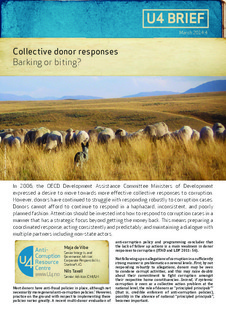| dc.contributor.author | de Vibe, Maja | |
| dc.contributor.author | Taxell, Nils | |
| dc.date.accessioned | 2018-01-04T08:19:02Z | |
| dc.date.available | 2018-01-04T08:19:02Z | |
| dc.date.issued | 2014-03-25 | |
| dc.identifier | oai:www.cmi.no:5097 | |
| dc.identifier.citation | Bergen: Chr. Michelsen Institute (U4 Brief 2014:4) 4 p. | |
| dc.identifier.uri | http://hdl.handle.net/11250/2474943 | |
| dc.description.abstract | In 2006, the OECD Development Assistance Committee Ministers of Development expressed a desire to move towards more effective collective responses to corruption. However, donors have continued to struggle with responding robustly to corruption cases. Donors cannot afford to continue to respond in a haphazard, inconsistent, and poorly planned fashion. Attention should be invested into how to respond to corruption cases in a manner that has a strategic focus beyond getting the money back. This means preparing a coordinated response; acting consistently and predictably; and maintaining a dialogue with multiple partners including non-state actors. | |
| dc.language.iso | eng | |
| dc.publisher | Chr. Michelsen Institute | |
| dc.relation | U4 Brief | |
| dc.relation | 2014:4 | |
| dc.relation.ispartof | U4 Brief | |
| dc.relation.ispartofseries | U4 Brief 2014:4 | |
| dc.relation.uri | https://www.cmi.no/publications/5097-collective-donor-responses-barking-or-biting | |
| dc.subject | Aid | |
| dc.title | Collective donor responses: Barking or biting? | |
| dc.type | Report | |
